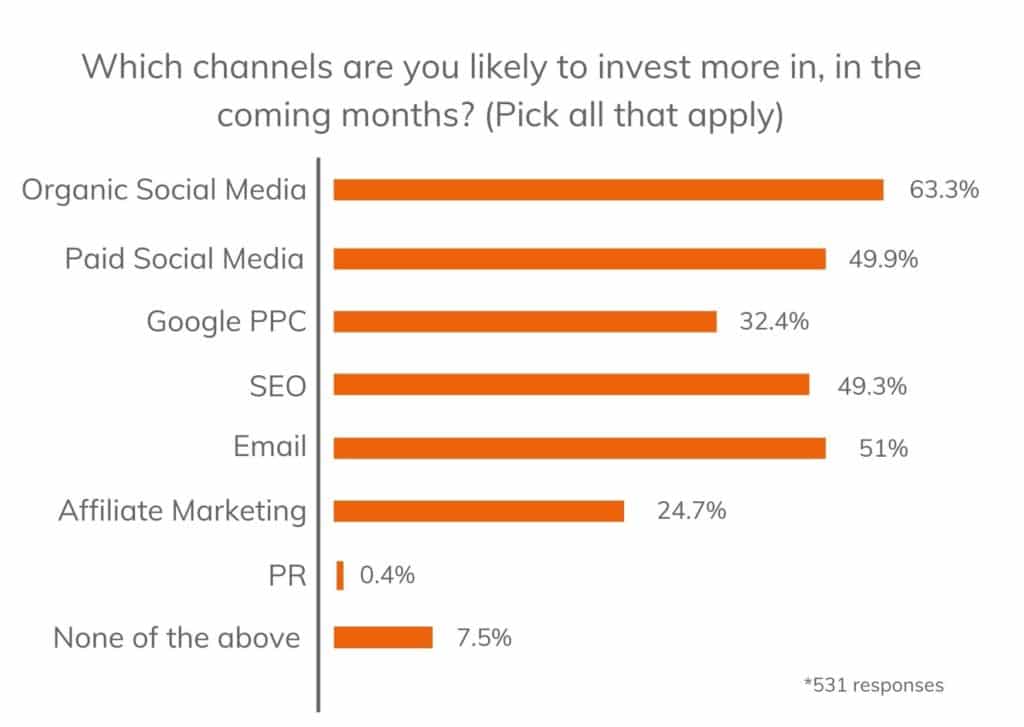How will COVID-19 change your Digital Marketing Strategy for 2021?
In March 2020, when the pandemic was peaking in the UK, we received an influx of requests for guidance on digital marketing and social media strategies. We published a blog and video on how you should adjust your social media strategy for coronavirus.
With social media usage spiking and brand engagements dropping, marketing strategies needed to be adapted, and quickly. The Marketing Meetup alongside ContentCal, has recently released a report on the state of marketing in 2020 and we’ve delved into the stats to see just how much marketing has changed and how social media content strategies will continue to change in the future.
A Shift From Paid to Organic Social Content
ContentCal surveyed 563 marketers across a variety of backgrounds and levels of seniority on their experience with COVID-19 and how it affected their digital marketing. When asked what had already changed within their digital marketing strategy, a huge 93% said that they have increased their focus on content this year. This focus can be split into three core areas:
- 62% focusing on organic content (blogs, social etc)
- 51% investing in educational middle-of-funnel content (webinars, courses etc)
- 32% focus more on top-of-funnel awareness messaging
Not changing or adjusting marketing strategies for the pandemic has just not been an option. 51% of the respondents said that they have increased their content production this year despite the teams being the same size or even smaller.
When asked how marketers have dealt with capacity in this huge shift to digital-first content marketing, many respondents said that they have made investments in outsourcing copy and content creation.
Huge Investments in Social Media Strategy for 2021
Two trends that have exploded are the big spikes in internet and social media usage, and the pivot to focus on brand values over too many sales messages. It’s no surprise then that, when asked where they will be investing in more in the coming months, social media, and digital strategy were the largest focus.
There was a preference towards the organic, with 63% saying they will be focusing more on this area, and 50% saying they will be investing more in paid social media. This data would suggest that marketers are simultaneously focusing on organic and paid social.
As social media experts, we always suggest that organic and paid social media strategies be utilised to complement and support each other in this way. Organic-led social media strategies help towards long-term growth and brand loyalty, whereas paid social media campaigns are a much faster way to make your brand, products and services known to new audiences.
Another area that saw a large shift was the 25% of marketers who said they will be investing more in affiliate marketing, which suggests a shift towards relationship-orientated marketing.
Change In Channels / Usage
The above data concludes the focus on social media marketing but is there a change in the channels that marketers should be targeting too? In a recent blog, we analysed the shifts in social media usage from this year and found that more people are finding ways to be sociable and stay connected.
A Shift Towards Greater Empathy?
‘Trust’ and ‘authenticity’ were mentioned frequently in respondent replies, with many saying they were taking time to re-evaluate brand messaging and build upon brand activation. One of our biggest recommendations for adjusting your social media strategy for coronavirus was to change your messaging when it comes to social content, focusing more on empathy and adding real value.
The combination of the pandemic and the Black Lives Matter movement this year has seen further shifts towards brand trust, values and ethics. Studies show that brand trust and reputation are now two of the most important attributes to customers when deciding whether to buy.
As OST’s Managing Director, Luke Brynley-Jones, says: “During COVID we’ve seen brands, especially B2B companies that aren’t usually quick to respond to online trends, having to rapidly adjust their strategies. If they don’t they risk alienating their customers – or indeed their own staff – by appearing insensitive or out of touch”.
This year, we’ve seen consumers buying from or boycotting brands due to their responses to the pandemic or the BLM movement. Brands acting appropriately in regards to current affairs, activism and sustainability are becoming more and more important to consumers.
What Does This Mean For Your Digital Strategy In 2021?
Firstly, if your brand has only managed to tread water rather than thrive during the pandemic, then that’s OK. When planning your digital marketing strategy for 2021, though, you will need to adapt to how and where your audience interacts with you, and we’re here to tell you that there is a clear pathway to success.
Uncertainty across every avenue means that people are looking for guidance on what happens next. Businesses that invest in brand building on social over sales messages, and gaining trust from their audience will be those that win.
With more screen time for all, social media is taking up a proportion of that extra screen time as people are yearning for human contact. Authentic online influencers have been using their social platforms to gain even more influence and take up more of an audience share, and is now something to additionally consider.
Do you need help with your digital marketing strategy for 2021? Contact us.



